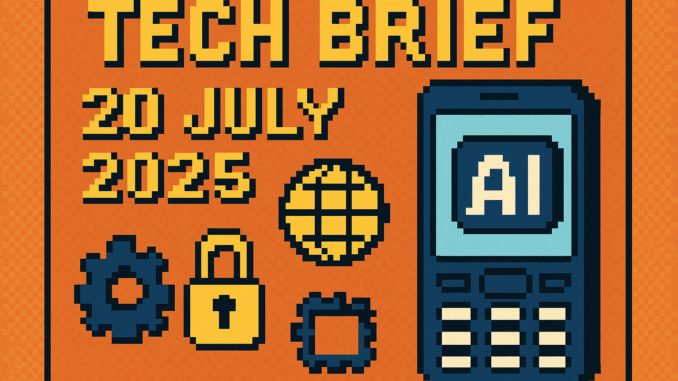
We’ve all felt that jolt when a favourite website won’t load, or marvelled at a film scene that looks impossibly real. Tech Brief 20 July 2025 brings stories that aren’t just headlines, they’re reminders of how our digital lives are shaped by invisible cables, clever code, and the occasional leap of creative faith. Missed yesterday’s Tech Brief? Catch up here before diving in.
Perplexity in talks with phone makers to pre-install Comet AI mobile browser on devices
Like the Netscape/Microsoft browser wars, the race to define how we search is heating up again. Nvidia-backed Perplexity AI is negotiating with mobile manufacturers to pre-install its Comet browser on new devices. Comet’s unique selling point is tightly integrated generative AI, positioning it as an alternative to Google’s default search experience.
This move signals a possible shift in the browser landscape. Over the decades, choice and control have been central to British digital culture. Comet’s approach could revive that spirit, offering users new ways to interact with mobile search.
Industry watchers are keen to see if AI-native browsers can disrupt entrenched habits. For anyone who’s ever tweaked browser settings or swapped out toolbars, the promise is more personal, context-aware browsing, but it also raises questions about privacy and data control.
Britain’s Digital Lifelines: Undersea cable attacks risk rises, warns report
If you’ve ever lost connection in the middle of a video call, you know how fragile our digital lifelines can feel. A recent report warns that state-backed attacks, particularly from Russia and China, are targeting the undersea cables that carry 99% of global internet traffic. Though specific attacks remain unconfirmed, incidents in the Baltic Sea and near Taiwan have highlighted the vulnerability of these vital data arteries.
Protecting undersea cables is a bit like guarding the world’s biggest, most fragile extension lead. Over the decades, the physical backbone of the internet has evolved, but its fragility remains a concern.
Let’s not forget the engineers who lay cables beneath oceans, unsung custodians keeping our conversations, cat videos, and Ceefax memories flowing. For users and businesses alike, the implications are profound: connectivity can be disrupted at the most fundamental level.
Peer warns IT suppliers against partnering with Fujitsu in government contracts
A UK peer has issued a public warning to IT suppliers about collaborating with Fujitsu on government contracts, directly referencing the company’s involvement in the Post Office Horizon scandal.
Fujitsu has secured more than £500 million in government deals since January 2024. The Horizon case, still unresolved, remains a touchstone for debates about accountability and oversight in British public-sector technology.
With the introduction of British home computers, trust in suppliers was a matter of pride. Today’s scrutiny of procurement practices is a reminder that transparency and responsibility are non-negotiable, especially when public funds and services are at stake. Let’s not forget the public sector IT teams quietly working to keep systems honest and resilient.
‘You can make really good stuff, fast’: new AI tools a gamechanger for film-makers
If you’ve ever watched a film and wondered, “How did they do that?”, you’re not alone. AI tools are transforming independent filmmaking, making it possible to generate high-quality scenes, such as complex geopolitical landscapes, with minimal resources.
Filmmakers praise this shift for democratising production, while critics warn of copyright and creative risks. Since the days of DIY video culture and camcorder experimentation, British creators have embraced new tools to push boundaries. The arrival of AI in film production is the latest leap, making creative expression more accessible but also sparking debate about originality and ownership.
Let’s not overlook the indie filmmakers who stretch every pixel and pound, today’s unsung digital storytellers.
From the Wayback Machine
On This Day: 1969 – Apollo 11 Moon Landing. Neil Armstrong became the first human to walk on the Moon, fulfilling President Kennedy’s challenge and marking a milestone in human exploration. The Apollo Guidance Computer, with less processing power than a modern calculator, helped manage the landing. Today’s embedded systems and mission-critical software still draw on the engineering principles developed for Apollo. The collaborative, goal-driven approach of the Apollo programme continues to influence ambitious tech projects worldwide.
What This Means
Tech Brief 20 July 2025 highlights how advances in AI, security, and accountability shape our digital lives. Let’s stay alert to how infrastructure, transparency, and creative tools evolve: each decision impacts our shared future. Tech Brief 20 July 2025 is your daily prompt to join the conversation and help shape what comes next.
Stay curious, question what’s running under the hood, and share which digital breakthrough has changed the way you work or create below.
Missed yesterday’s Tech Brief? Catch up here

Leave a Reply